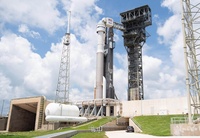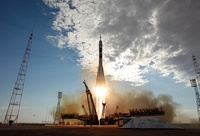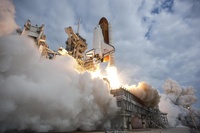Michael Fincke
American - (NASA)
Active
Date of Birth: March 14, 1967
Age: 57
Edward Michael "Mike"/"Spanky" Fincke is an American astronaut who formerly held the American record for the most time in space (381.6 days). His record was broken by Scott Kelly on October 16, 2015. He was born in Pittsburgh, Pennsylvania, but considers its suburb Emsworth to be his hometown. He is a United States Air Force officer and a NASA astronaut, and served two tours aboard the International Space Station as a flight engineer and commander. He flew on one Space Shuttle mission, STS-134 as a Mission Specialist.
Upcoming Spaceflights
Atlas V N22 | Starliner-1
United Launch Alliance | United States of AmericaCape Canaveral, FL, USA
Aug. 31, 2025, midnight
Status: TBD
Mission:
Starliner-1 is the first crewed operational flight of a Starliner spacecraft to the International Space Station as part of NASA's Commercial Crew Program.
Low Earth OrbitSoyuz-FG | Soyuz TMA-4
Progress Rocket Space Center | RussiaBaikonur Cosmodrome, Republic of Kazakhstan
April 19, 2004, 3:19 a.m.
Status: Success
Mission:
Soyuz TMA-4 begins Expedition 9 by carrying 3 astronauts and cosmonauts to the International Space Station. Russian Commander, cosmonaut Gennady Padalka alongside Flight Engineers, Michael Fincke (NASA) & André Kuipers (ESA) will launch aboard the Soyuz spacecraft from the Baikonur Cosmodrome in Kazakhstan and then rendezvous with the station. It landed on October 24, 2004, 00:35:00 UTC
Low Earth OrbitSoyuz-FG | Soyuz TMA-13
Progress Rocket Space Center | RussiaBaikonur Cosmodrome, Republic of Kazakhstan
Oct. 12, 2008, 7:01 a.m.
Status: Success
Mission:
Soyuz TMA-13 begins Expedition 18 by carrying 3 astronauts and cosmonauts to the International Space Station. Russian Commander, cosmonaut Yuri Lonchakov alongside Flight Engineer, Michael Fincke (NASA) & spaceflight participant Richard Garriott (Space Adventures) will launch aboard the Soyuz spacecraft from the Baikonur Cosmodrome in Kazakhstan and then rendezvous with the station. It landed on 8 April 2009, 07:16 UTC
Low Earth OrbitSpace Shuttle Endeavour / OV-105 | STS-134
National Aeronautics and Space Administration | United States of AmericaKennedy Space Center, FL, USA
May 16, 2011, 12:56 p.m.
The National Aeronautics and Space Administration is an independent agency of the executive branch of the United States federal government responsible for the civilian space program, as well as aeronautics and aerospace research. NASA have many launch facilities but most are inactive. The most commonly used pad will be LC-39B at Kennedy Space Center in Florida.
Hyperbola-1
Yunyao-1 15-17
Launch Area 95A - Jiuquan Satellite Launch Center, People's Republic of China3 weather satellites performing atmospheric measurements using GNSS Radio Occultation for a Tianjin based company. Constellation is planned to have a…
Ariane 62
Maiden Flight
Ariane Launch Area 4 - Guiana Space Centre, French GuianaMaiden Flight of the Ariane 62 launch vehicle, carrying ten cubesats, two deployers, five experiments, and two reentry capsules.
Falcon 9
Türksat 6A
Space Launch Complex 40 - Cape Canaveral, FL, USATürksat 6A is Turkey's first domestically manufactured geostationary communications satellite. It is to reside in 42° East orbital slot, providing se…
Long March 6A
Tianhui 5 Group 02
Launch Complex 9A - Taiyuan Satellite Launch Center, People's Republic of ChinaA pair of satellites officially described as for cartographic surveying purposes, details TBD.
Firefly Alpha
FLTA005 (Noise of Summer)
Space Launch Complex 2W - Vandenberg SFB, CA, USAFifth flight of the Firefly Alpha small sat launcher, carrying eight cubesats for NASA's ELaNa 43 (Educational Launch of a Nanosatellite) mission.





